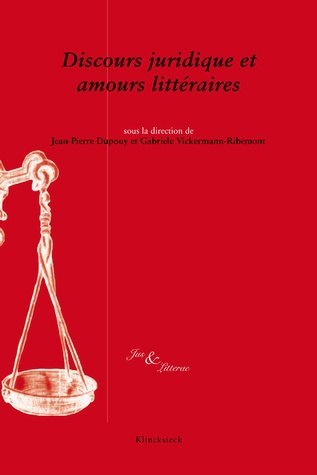Nous utilisons des cookies pour améliorer votre expérience. Pour nous conformer à la nouvelle directive sur la vie privée, nous devons demander votre consentement à l’utilisation de ces cookies. En savoir plus.
DISCOURS JURIDIQUE ET AMOURS LITTERAIRES
EAN : 9782252038987
Paru le : 21 mars 2013
-
 Livraison gratuite
Livraison gratuite
en France sans minimum
de commande -
 Manquants maintenus
Manquants maintenus
en commande
automatiquement -
 Un interlocuteur
Un interlocuteur
unique pour toutes
vos commandes -
 Toutes les licences
Toutes les licences
numériques du marché
au tarif éditeur -
 Assistance téléphonique
Assistance téléphonique
personalisée sur le
numérique -
 Service client
Service client
Du Lundi au vendredi
de 9h à 18h
- EAN13 : 9782252038987
- Editeur : Klincksieck
- Date Parution : 21 mars 2013
- Disponibilite : Disponible
- Barème de remise : NS
- Nombre de pages : 288
- Format : 0.00 x 16.00 x 24.00 cm
- Poids : 901gr
- Interdit de retour : Retour interdit
-
Résumé :
Although essential, one fact is often overlooked: most writers from the Middle Ages to the Enlightenment were educated in the field of law. Yet, if people recall this and connect it with the obvious truth that amorous desire is this literature's main theme, they will scarcely be surprised that the issue of the relationship between legal discourse and romantic literature has become the subject of a book.
Moreover, it is undoubtedly because of their legal education that writers of the Middle Ages and 16th century often presented their fictional writings devoted to love in a legal form. So much so that as early as in the 14th and 15th centuries, questioning about feelings of love borrowed its constitutive form from the court system: the argument on both sides before a tribunal, the judgment rendered by a competent authority and the enforceability of the judgment.
A major section of the book is also devoted to examining the various forms of refraction in the literary field matrimonial laws through the years. In our modern era, these developments led to French royal law (in contrast to canonical law, which relied first and foremost on the exchange of consent between spouses) which increasingly required parental consent, laying the groundwork for a literature particularly abundant in terms of elopements, clandestine and nocturnal marriages, and consents obtained through trickery.
-
Biographie :
Gabriele Vickermann-Ribémont est maître de conférences à l'université d'Orléans.


